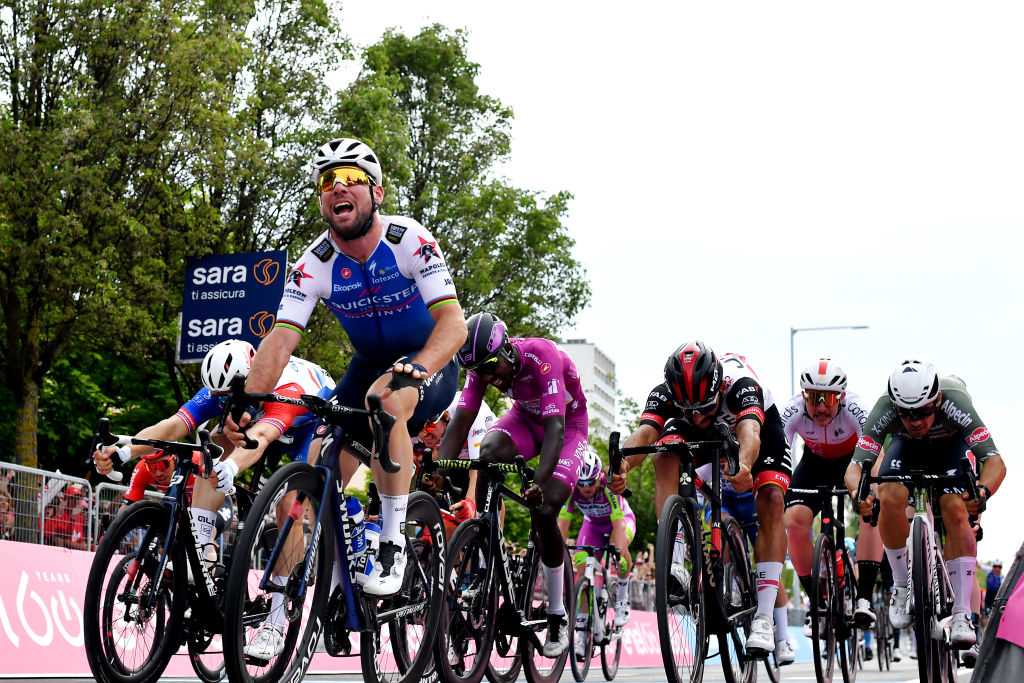Mark Cavendish: I’m old, but I’m still me
Manxman claims Giro d’Italia sprint victory on Sunday

Nine years had passed since Mark Cavendish last won at the Giro d’Italia, but somehow it felt like very little had changed between Brescia and Balatonfüred (Lake Balaton).
He is older now, of course, but the speed somehow remains intact. His epitaph was written several times over in the years since, too, but that has served only to keep stoking the flame. Cavendish burns as intensely as he ever did.
“I’m old, but I’m still me,” Cavendish said softly to host broadcaster RAI as he waited to mount the podium after his victory on stage 3.
On the shores of Lake Balaton, Cavendish opened his effort some 300 metres from home. It initially looked as though he had struck too soon, but Arnaud Démare (Groupama-FDJ) and Fernando Gaviria (UAE Team Emirates) couldn’t manage to get back on terms.
“I started my sprint earlier than normal, 300 metres from the line, and that was a bit much because the others were coming back,” said Cavendish.
As per habit, he marked his 160th career victory by dousing his teammates in effusive praise, but there was, perhaps, a subtle admonishment of the QuickStep-AlphaVinyl management, who have placed him at number two in the depth chart of sprinters this season behind Fabio Jakobsen.
QuickStep’s pre-eminent lead-out man Michael Mørkøv has been deployed primarily in Jakobsen’s service this year, but the Dane is present at the Giro, and he piloted Cavendish in the finishing straight after long stints from Davide Ballerini and Bert Van Lerberghe.
The latest race content, interviews, features, reviews and expert buying guides, direct to your inbox!
“When you have guys like this, it leaves me full of confidence because I know it’s on me. I’ve got the best group of guys around me. I know I’ve not got any excuses,” said Cavendish in his post-race press conference. “I haven’t had a full team this year yet like Fabio, so it’s nice to get it here for the Giro.”
Cavendish’s career had looked to be over in the gloomy, locked-down autumn of 2020, when he tearfully hinted at retirement in the mixed zone of a Gent-Wevelgem played out on bare and empty roads.
His career had been one of diminishing returns after several years blighted by illness, and when QuickStep manager Patrick Lefevere threw him a lifeline that winter, it felt like an epilogue rather than a new beginning.
When Sam Bennett’s knee injury vacated a place on QuickStep’s Tour team, however, Cavendish seized the opportunity, winning four stages to equal Eddy Merckx’s record haul of 34. It remains to be seen if Cavendish will get the chance to surpass that mark. Jakobsen has been pencilled in for the Tour, but nothing is set in stone just yet.
In the here and now, Cavendish will have ample opportunity to add to his running total of 16 Giro stage wins. Remarkably, he has yet to lose a Giro sprint in QuickStep colours, having won five from five on the 2013 race, when he also won the points competition in Brescia.
Back then, Cavendish was, by consensus, the fastest sprinter in the world. A fortnight shy of his 37th birthday, he remains resolutely in the very top tier of fast men, though he was reluctant to outline the precise structure of the sprint hierarchy of the 2022 peloton.
“I think there’s a few guys, but whether they’re strongest and fastest, that doesn’t necessarily mean the best. I haven’t ever been the strongest or fastest, but I’ve managed to win bike races,” Cavendish said.
“I think Caleb [Ewan, eighth on the stage] is the one with the fastest leg speed, I think Fabio is the strongest but that doesn’t necessarily mean you win bike races, you know. Sprinting is like chess on wheels. You’ve got to know how to beat the strongest in the world.”
Nine years on from his last Giro, Cavendish clearly hasn’t forgotten how.

Barry Ryan was Head of Features at Cyclingnews. He has covered professional cycling since 2010, reporting from the Tour de France, Giro d’Italia and events from Argentina to Japan. His writing has appeared in The Independent, Procycling and Cycling Plus. He is the author of The Ascent: Sean Kelly, Stephen Roche and the Rise of Irish Cycling’s Golden Generation, published by Gill Books.